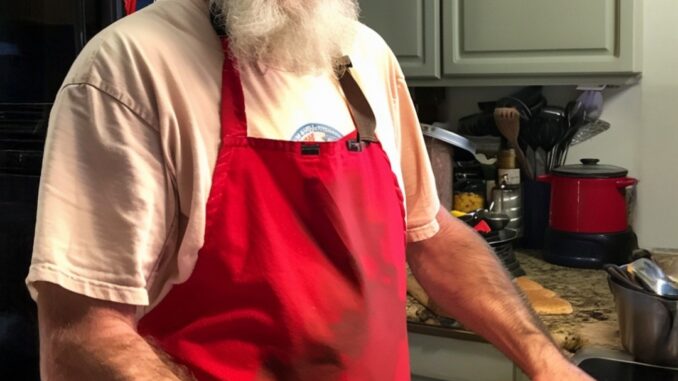
On a freezing winter night, a simple act of kindness changed Ellie’s life forever, bringing a homeless man named Jeff into her home—and unraveling secrets from a past she never imagined.
For months, I had noticed him sitting by the bench near the bus stop outside my office. Jeff always had the same small, battered kit, carefully mending shoes as if it were his calling. His clothes were clean but worn, his hands rough yet deft, moving with a precision that defied his circumstances.
There was something compelling about him. He never begged, never sought attention, and seemed content in his quiet, solitary work. At first, I simply passed by, but eventually, I started offering him a polite “hello.” He’d respond with a nod and a polite smile before returning to his task.
One afternoon, on impulse, I handed him a shoe with a broken heel. “Do you think you can fix this?” I asked, surprising even myself.
He looked up at me, his tired eyes warm and steady. “Sure,” he said, inspecting the shoe. “Give me about twenty minutes.”
As I sat nearby, watching him work, I was struck by his quiet concentration, treating my shoe as though it were the most important thing in the world. When he returned it, the repair was flawless.
“What’s your name?” I asked as I took the shoe.
“Jeff,” he said, slipping his tools back into the kit.
That small interaction stayed with me, but it wasn’t until a bitterly cold night just before Christmas that our paths truly intertwined. As I walked to my car, I spotted Jeff through the window of a café. He sat alone at a corner table, clutching a small, brown paper-wrapped package.
Curiosity and concern pulled me inside. “Jeff,” I said gently as I approached. “Why are you here? Don’t you have somewhere warm to go?”
He looked up, startled but calm. “Shelter’s full tonight,” he said quietly. “I’ll manage.”
The thought of him out in the freezing cold made my chest tighten. “Come home with me,” I blurted before I could second-guess myself.
His brows furrowed. “What?”
“We have a basement,” I explained. “It’s not much, but it’s warm. There’s a bed, and you can stay there tonight.”
He hesitated, searching my face. “You’re too kind,” he murmured, but after some coaxing, he agreed.
The next morning, I awoke to laughter and the smell of breakfast. Jeff was in the kitchen, flipping pancakes as my kids beamed at him from the table.
“Mom, Jeff’s so funny!” my youngest chirped through a mouthful of syrupy pancake.
Jeff glanced at me, sheepishly. “Hope you don’t mind. Thought I’d make myself useful.”
Not only had he cooked, but later, I discovered he’d fixed everything in the basement—from a wobbly chair to a leaky faucet. His quiet resourcefulness endeared him to us all.
That evening, I proposed an idea to my husband: “What if we let Jeff stay through the winter?”
After a thoughtful pause, he agreed. “But just for the winter.”
When I shared the news with Jeff, his expression was one of disbelief. “I don’t want to impose,” he said.
“You’re not,” I assured him. “You’ve already done so much for us.”
As the weeks passed, Jeff became part of the family. He had an easy rapport with the kids and a knack for fixing things. Yet, there was a quiet sadness about him, a burden he carried that he never spoke of—until one evening.
I showed him an old photo of my parents, laughing together. “This is my mom and dad,” I said.
Jeff froze. His face paled, and his hands trembled as he stared at the image. “Your mom…” he whispered.
“What is it?” I asked, alarmed.
But instead of answering, he abruptly left the room. By morning, he was gone, leaving behind only the brown paper package he always carried.
Inside, I found a photograph and a letter. The photo was of a younger Jeff, smiling with a baby wrapped in a pink blanket. Written on the back were the words: Jeff and Ellie, 1986.
My hands shook as I read the letter. In it, Jeff confessed he was my father. He described how he and my mother had fallen in love, how his mistakes had driven her away, and how he had spent years searching for us. He admitted he recognized me the first time we spoke but hadn’t found the courage to tell me.
“I love you, Ellie,” the letter concluded. “I hope someday you can forgive me.”
Stunned, I confronted my mother, who tearfully admitted the truth. She had kept Jeff out of my life, hurt and unwilling to forgive him.
For weeks, I searched for Jeff, desperate to reconcile. Then one afternoon, I found him sitting on a bench, looking lost in thought.
“Jeff,” I called softly.
He looked up, eyes filled with regret. “Ellie… I didn’t think I deserved to face you again.”
Sitting beside him, I took his hand. “Maybe you didn’t. But you’re here now, and that’s what matters.”
Tears welled in his eyes. “Can you forgive me?”
“I already have,” I said, pulling him into a tight embrace.
From that moment on, Jeff became a true part of my life. My kids adored him, and as “Grandpa Jeff,” he finally found the family he had lost. Though our path to healing wasn’t easy, it was worth every step. Forgiveness didn’t just restore Jeff; it brought peace to my heart, too.
Because sometimes, second chances aren’t about who deserves them. They’re about love—and the willingness to fight for it.
Leave a Reply